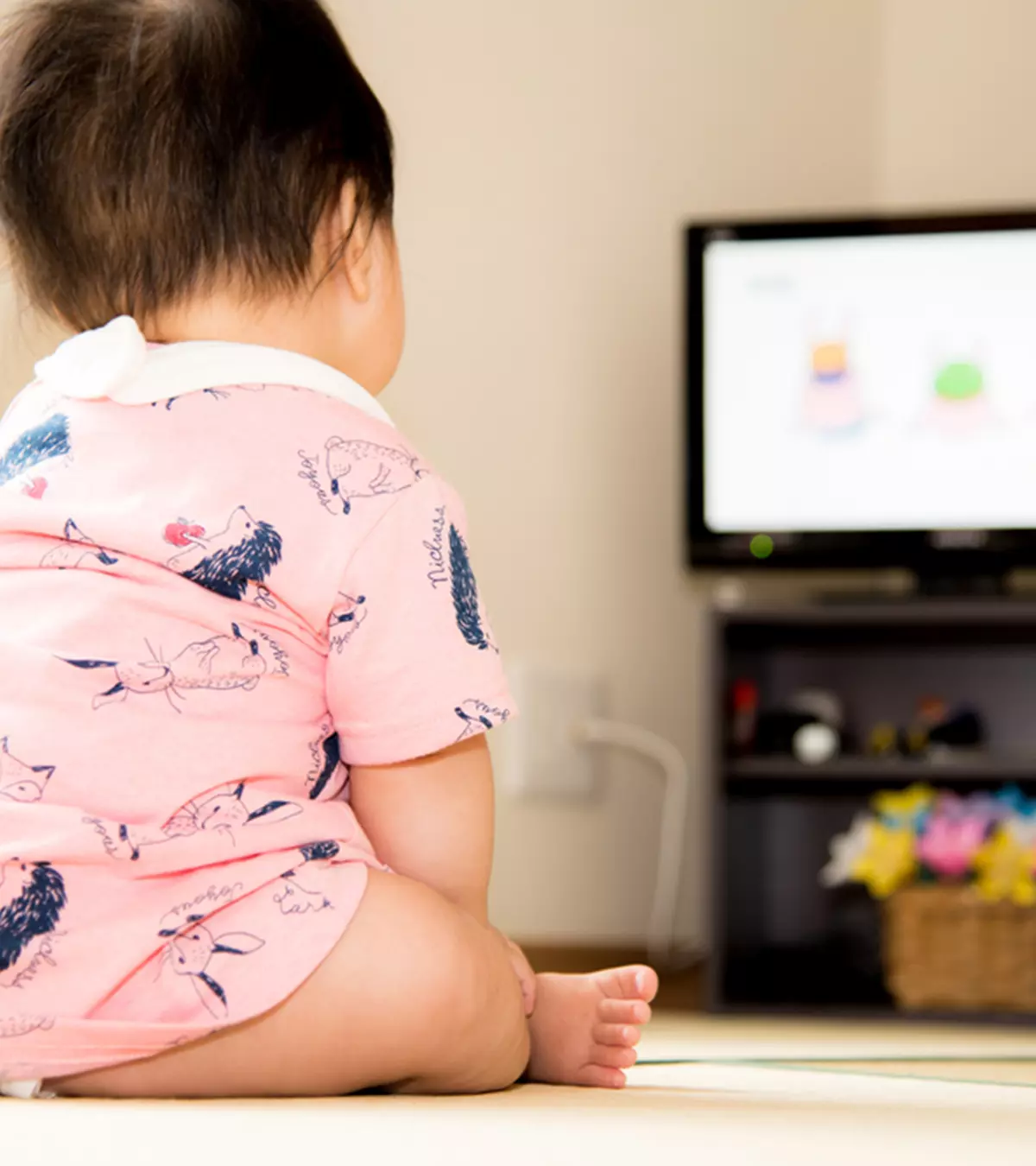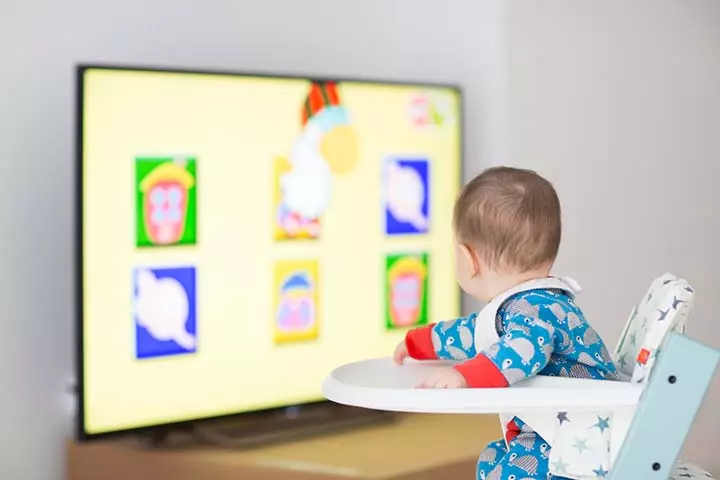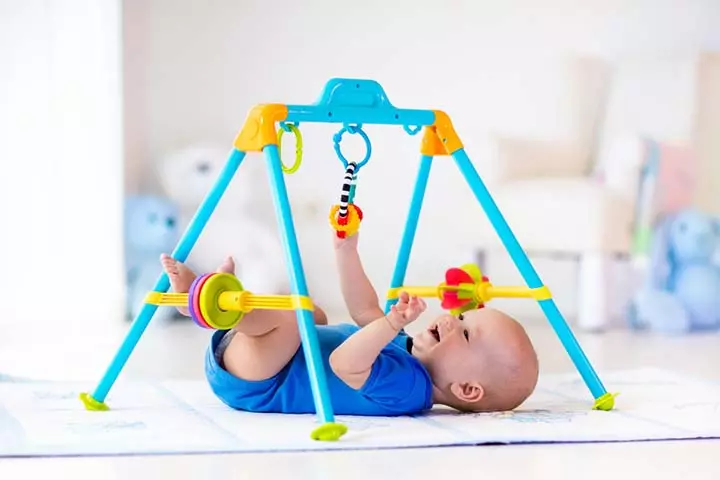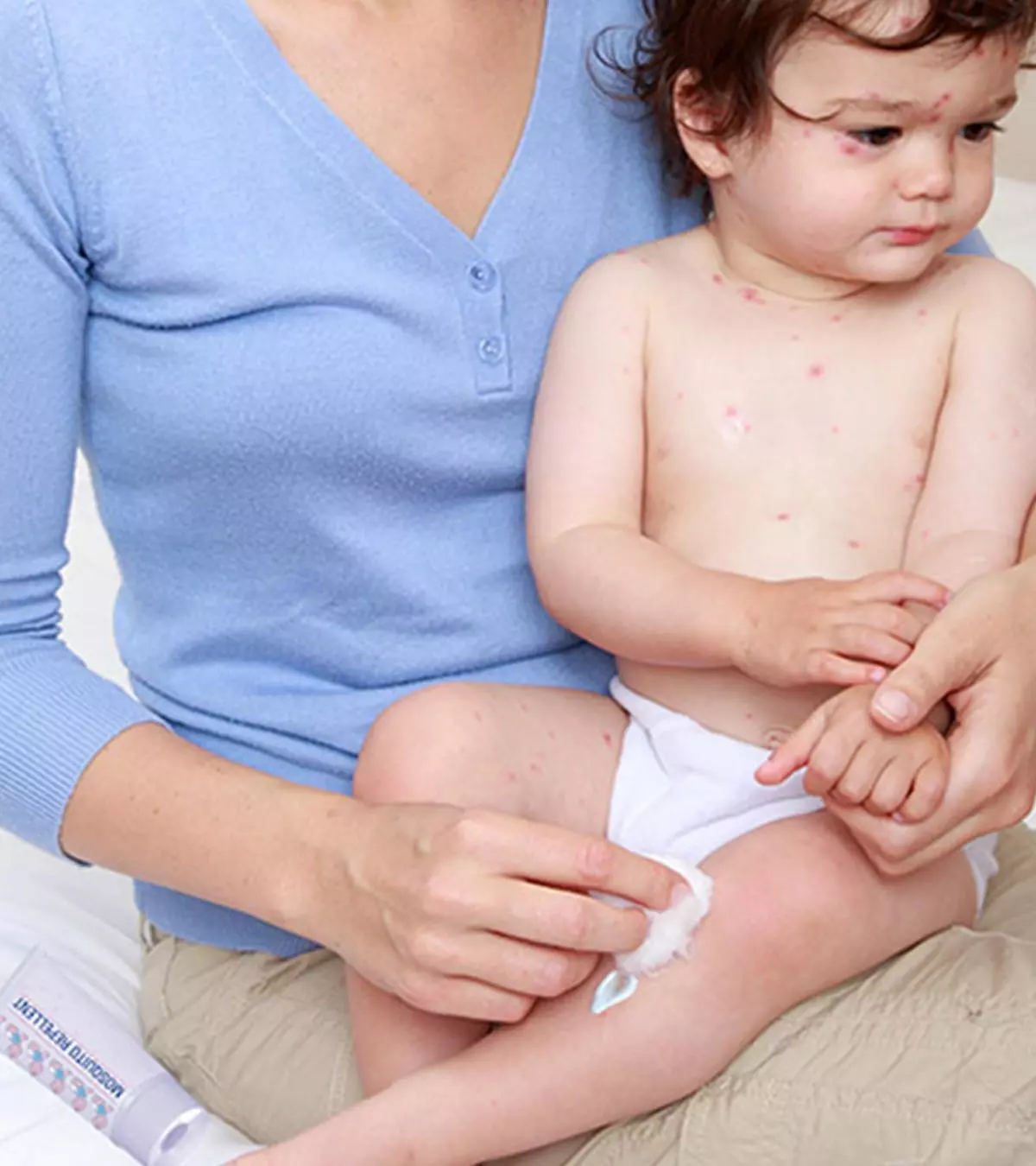
Image: Shutterstock

A baby watching TV might look amusing, but it isn’t something they should be doing. Avoiding television in today’s world is almost impossible when almost every house has at least one television in it. Then, parents and caregivers often place the babies in front of the television to keep the baby engaged while parents do tasks such as feeding or changing diapers.
But as convenient as it seems, babies staring at television can be harmful. Babies can easily get attracted to colorful, bright images on television and might also get addicted to them. Besides, watching television is likely to make them stare at the screen, which is a no-use activity for the baby.
Keep reading to learn the effects of watching television on babies and alternatives to lead the baby away from the device.
Key Pointers
- According to the American Academy of Pediatrics, babies under 18 months should have no screen time.
- Regularly watching television can negatively affect the baby’s brain development, delay their speech and language development, and trigger vision problems.
- Painting with edible paints, playing peek-a-boo, book reading, and strolling on the beach or a nearby park are some engaging activities babies can do to have fun.
Is It Okay For A Baby To Watch TV?
The American Academy of Pediatrics (AAP) recommends no screen time for babies younger than 18 months (1).
Thus, infants should not watch television and even other devices with a screen, such as monitors, smartphones, and tablets. Television-watching is not recommended for older babies and toddlers, too.
Toddlers between 18 and 24 months may use high-quality educational apps on smartphones or tablets with their parents for a few minutes a day. Children older than two years may try high-quality apps for no more than an hour a day (19).
Dr. Tali Ditye, a neuroscience PhD from Massachusetts, says, “It’s not surprising that some experts believe TV can be too much for newborns, who are just learning to process all the sights and sounds in the world around them. While there’s no definitive answer on whether or not TV is harmful to babies, it’s generally recommended that parents limit their child’s screen time (including TV, computers, tablets, and phones) to one hour per day or less.”
 Experts say
Experts sayEffects Of Watching TV On Babies
Several studies and experts indicate that regular watching of television may have detrimental effects on the baby’s healthy development in the long run. According to psychologist Dr. Katie Kjelsaas, “In babies, screen time can negatively affect motor and cognitive development. It also disrupts sleep initiation and maintenance by interfering with natural melatonin production and overstimulating the brain’s cognitive and sensory systems.” The following effects may occur on babies.
1. Affects brain development
Watching television offers no benefit to the baby since they are too young to understand the images seen on the television. Babies watch TV because they find the bright and colorful images attractive. They cannot understand and identify the real-world equivalent of the TV’s images. For instance, a baby may see a TV advertisement of a toy, which they already have. However, they will not realize that it is the same toy they have in their hands.
Regular television-watching may cause the baby to focus predominantly on the on-screen program content, causing them to overlook real-world activities. It may affect brain development in the long run. Research indicates that television-watching offers no cognitive benefit to the baby, and there is no reason to let your baby watch television (2).
2. May cause speech and language delays

According to the American Academy of Pediatrics, on average, a parent speaks 940 words per hour when playing with their toddler. However, the number decreases to 770 just by switching on the television in the background with no one watching it (3). Therefore, the number of words you speak to your baby could significantly decrease if your baby is engrossed in watching television programs such as cartoons. The effect could be multi-fold if your baby spends a major part of their waking hours watching TV.
Babies learn the best when they interact with their parents and other caregivers. However, TV could take away the time, which could have been used in improving their language skills, affecting the baby’s speech and language skills eventually.
3. May affect healthy vision
Children tend to blink less often than adults when watching television (4). Constant staring at the TV may cause eye pain, eye redness, and blurred vision. Your baby’s eyes are also constantly focused on TV images closer to them. It may make it difficult to focus on distant objects immediately, and the eyes may take several hours to re-adjust (5).
Regular television watching could exacerbate all the short-term eye and vision problems. It may increase the risk of the baby developing myopia (nearsightedness) early in life, making it imperative to wear prescription glasses (6). According to the Centers for Disease Control and Prevention (CDC) Morbidity and Mortality report, among children between the ages of 2-17 years, 65.7% of boys and 64.6% of girls spent more than two hours of screen time daily (20).
Watching TV may also interfere with the looking process, interfering with the internal curiosity to explore objects and learn words to describe them. According to Dr. Glen Steele, professor of pediatric optometry, “When an infant sees a parent looking at an object and follows their gaze to that object by 12 months of age, they will be able to identify 335 words by 18 months of age. When they do not follow the parent’s gaze, they will only be able to identify 197 words by 18 months of age. Huge difference. This work was done by Andrew Meltzoff, Ph.D., at the University of Washington. Vision triggers curiosity, which triggers movement and exploration (21).”
4. May interfere with beneficial activities
According to Frederick Zimmerman, Associate Professor of Health Services, University of Washington, “Exposure to TV takes time away from more developmentally appropriate activities such as a parent or adult caregiver and an infant engaging in free play with dolls, blocks or cars.”
The more your baby watches television, the less time you get for games and activities that exercise and improve a baby’s developmental milestones. Your baby will learn a lot more from your facial expressions, tone of voice, and body language than they can learn from television (7).
Also, images on TV are no replacement for real-world activities. For instance, a rolling ball on the floor will provide a three-dimensional view than a two-dimensional view of a rolling ball video on the TV. The rolling ball in real life will stimulate a baby’s vision, eye-hand coordination, speed-distance judgment, and even social skills, which television can never stimulate (8).
5. May influence eating habits

Television-watching may create bad habits in kids and interfere with their healthy eating habits, increasing the risk of malnutrition (overweight or underweight) in the long run. Research indicates that eating on the couch while watching TV may interfere with the brain’s ability to realize satiety, causing overeating. However, some children may eat less than needed due to the distraction caused by a television (9). Although there are no specific studies on babies, it may lead to similar results, especially in older babies who rely more on solid food. Television-watching may interfere with healthy eating habits, increasing the risk of malnutrition (overweight or underweight) in the long run.
6. May affect sleep
Watching television regularly could interfere with a baby’s healthy sleep patterns and bedtime routine. The issue could be profound if the baby watches television, usually in the evening. It may reduce the number of sleeping hours at night. The reason behind sleep interference could be the television content, which may keep the brain in an active state even after TV-watching is suspended. Some television screens emit blue light, which may suppress the secretion of melatonin, a hormone that regulates the sleep-wake cycle (10).
Helene, a mother, shares her experience, “At the height of her addiction, we would watch Baby Einstein the whole day! Like 5 episodes non-stop! There was one time she wouldn’t stop watching even if it was past midnight already! It was like playing a game of who could outlast each other. Well, Miley won. She would just wake me up when the episode ended so I can play the next video. When she woke up the next day, the first thing she said was “Baby Einstein! Watch Baby Einstein!” After that, Vins and I said that Miley needed an intervention already! Once she hears the opening music and sees the first scenes, she starts jumping like crazy and shouting all the names of the animals or things on the screen (i).”
 Quick fact
Quick factAlternatives To TV-Watching For Babies
Parents can try alternatives to TV-watching to distract the baby and indulge them in activities that can benefit them (3) (8).
- Baby-friendly games: Games can provide a plethora of opportunities for you to talk and interact with your baby. You do not need any specific time to play. Bring a toy and have pretend-play or other games whenever you sense your baby is bored or fussy. Several toys come with sounds that play with words or letters, helping a baby’s language development. You may also play classic games, such as peek-a-boo and toss the ball.

- Involve the baby in day-to-day activities: Instead of placing the baby in front of the TV while you go along with your daily activities, make the baby a passive participant in it. For instance, while cooking in the kitchen, place the baby on a high chair, give them some plastic spoons, and let them hit those spoons while you cook. Let the baby play with the clothes while you are folding them. Speak to the baby and describe what you are doing. Respond to them when they attempt to talk.
- Sensory games: An excellent example of a sensory game is providing your baby edible paints to make different artworks on chart paper. You may make edible paints with purees or broth. Older babies can play with baby-safe clay. Baby-safe mirrors are also excellent at stimulating the baby’s visual acuity than the TV screen. Sensory toys and games keep the baby engrossed, reducing the need to watch television. Positional games involving walking, rocking, swaying, and lying on their stomach also engage the senses that coordinate body movements (22).
 Quick tip
Quick tip
- Book-reading: Did you know the CDC recommends reading to babies as young as two months old? Reading is one of the best activities to encourage the timely achievement of a baby’s speech-related milestones (11). Pick books with letters in large fonts and colorful illustrations. Point at an image and say its name. You may ask older babies to point at the character when you state its name.
- Sing rhymes, lullabies, and songs: Sing a song or rhyme of your choice along with simple hand gestures that the child can imitate (22). Make sure you look at the baby when you sing so that they know you are doing it for them. Encourage the baby to join you along, even if it is through coos and gurgles. Remember to smile a lot and use toys, such as rattles, to make the activity interesting for the baby.
- Outdoor play: Take your baby to the beach or the local park for a stroll. Have a picnic and let the baby sit under the shade of the tree while soaking the various views of trees, birds, and people. Older babies can be encouraged to crawl while toddlers can hold your hand and walk. The outdoors offers several interesting sights, providing better cognitive stimulation to the baby than watching moving images on the television screen.
Does TV-Watching Cause Autism?
There is no conclusive evidence that regular TV-watching by babies could directly cause or increase the risk of autism (12). A study found that exposure to longer screen time at 12 months of age was associated with the diagnosis of autism spectrum disorder at 3 years of age, and the incidence was more among boys. However, autism may have several causes and further research is required to specifically prove any such claim (13) (14).
Ways To Reduce Screen Time For Babies
Despite the insistence on the lack of screen time for babies, some parents or other caregivers may eventually turn to television when they want their children to keep engaged for a while. When this happens repeatedly, it may cause screen dependence in children, requiring parents to intervene. Here are a few ways parents may cut down on screen time for babies(19) (23).
- Restrict screen time for younger children. The American Academy of Child and Adolescent Psychiatry recommends restricting screen use for children under the age of 18 months to video chatting with adult family members living far away from them.
- Ensure that the child takes adequate breaks from television. It is recommended that parents follow the 20-20-20 rule, where children sit twenty feet away from the television to watch a show for twenty minutes and then take a twenty-minute break to do other activities (21).
- Have screen-free meals. Avoid using television as a distraction tool to encourage the baby to eat without tantrums. Instead, share meals as a family, making the dinner table a happy and safe place for the baby to explore their preferences and portions.
- Avoid screens in the bedroom. A TV in the bedroom may encourage the baby to switch it on. Thus, keep the bedroom a screen-free zone. Also, avoid viewing television 30 to 60 minutes before bedtime, and instead have a soothing bedtime routine for the baby, which involves baths and reading.
- Schedule plenty of playtime with the baby. Ensure that the baby has hours where they actively move around the house. This may help them practice motor milestones such as crawling, sitting, walking, running, or jumping. Allow the baby to explore sensory play during tummy time. For toddlers, encourage the exploration of new objects and hobbies.
- Allow the baby to be exposed to new people and places. Take them to parks, beaches, and other places where they can connect with and observe nature. Also, provide adequate opportunities for the child to interact with other people through family get-togethers. Have screen-free travel time when you take long trips and holidays to ensure the baby gains the full experience of the trip.
- Be a role model for restricted screen usage. Provide the baby undivided attention when you are with them. Put away the phones or laptops, switch off the television, and actively engage in storytelling, reading, playing, or communicating with the baby.
Frequently Asked Questions
1. How much TV does the average toddler watch?
Recent research reveals that the average toddler in the United States spends one to three hours per day watching video media and television programming (15).
2. Do TVs keep babies awake?
According to the American Academy of Pediatrics, introducing infants and babies to screen time or TV before 18 months may negatively affect their sleep schedule and attentiveness (3). Therefore, it is advised to discourage your baby from watching TV until they are around 1.5 years old.
3. What should I keep in mind when watching TV in my room while my baby sleeps?
Dr. Ditye suggests, “First, keep the volume low so as not to disturb your little one. Second, consider what you’re watching – violent or graphic images may not be appropriate for an infant. And finally, be aware that your baby may startle or cry if they see you watching TV while they’re sleeping – so it’s best to avoid having the television on if possible.”
4. Are there any benefits to letting babies watch TV, and if so, what are they?
Educational TV shows for toddlers can expose children to wildlife, the natural environment, and more, and can introduce children to music. They also introduce children to cultures and places they might not encounter (16). Audiovisual aid, when used in moderation, can be beneficial.
5. How can I make TV time educational for my baby?
You can make TV time educational and fun for your child by watching informative yet fun baby TV shows, such as Sesame Street, If I Were an Animal, or Little Einsteins, with them and explaining to them the happenings in the show (17 ).
6. Can TV overstimulate a newborn?
Newborn babies are usually overstimulated when there are loud sounds, bright colors, or too much activity in their surroundings (18). Hence, if the room where your newborn is has the tv turned on with high volume or bright and flashy pictures, it might overstimulate them.
7. How should I guide my baby regarding screen time?
Designate screen-free times during meals or family activities to help encourage healthier habits. Also, set time limits based on their age, and ensure you do not schedule their screen time close to bedtime.
There are plenty of debates going around about babies watching TV. Like every new parent, you may also have several questions regarding when to introduce TV time for your child and right screen time. As with every other form of entertainment, there are both good and bad effects of television on babies and toddlers. Experts recommend preventing screen time for babies younger than 18 months. Sitting in front of a TV for longer periods can have several adverse effects on their brain development, speech and language development, eyesight, physical growth, etc. Instead, involve your baby in other interesting activities or hobbies so that they do not stay glued to the television.
Infographic: What Does Research About Screen Time For Babies Say?
Children are exposed to screens from a very early age. Although watching TV or playing on phones might seem harmless entertainment, research shows that screen time for babies has adverse effects on their minds and bodies. Read this infographic to know what researchers say about exposing babies to screens.
Some thing wrong with infographic shortcode. please verify shortcode syntax
Personal Experience: Source
MomJunction articles include first-hand experiences to provide you with better insights through real-life narratives. Here are the sources of personal accounts referenced in this article.
i. My babies love Baby Einstein.https://mrsmommyholic.blogspot.com/2012/01/my-babies-love-baby-einstein.html
References
1. Where We Stand: Screen Time; American Academy of Pediatrics
2. Marie Evans Schmidt et al., Television Viewing in Infancy and Child Cognition at 3 Years of Age in a US Cohort; U.S. National Library of Medicine
3. David L. Hill, Why to Avoid TV for Infants & Toddlers; American Academy of Pediatrics
4. David K Coats, Do i need to be concerned that my child does not blink while watching TV?; American Academy of Ophthalmology
5. How Too Much Screen Time Affects Kids’ Eyes; Children’s Hospital of Philadelphia
6. Is Too Much Screen Time Harming Children’s Vision?; American Academy of Ophthalmology
7. Jennifer Seymour,40 percent of 3-month-old infants are regularly watching TV, DVDs or videos; University of Washington
8. Screens: Not for babies!; South Dakota Department of Health
9. Lisa Duchene, Probing Question: Does eating while watching TV harm kids?; Penn State University
10. Media and Young Minds; American Academy of Pediatrics
11. Milestone Moments; CDC
12. 4 things that don’t cause autism; Aruma Disability Services
13. Megumi Kushima et al.; (2025); Association Between Screen Time Exposure in Children at 1 Year of Age and Autism Spectrum Disorder at 3 Years of Age.The Japan Environment and Children’s Study.
14. About Autism Spectrum Disorder; CDC
15. Couch-Potato Tots Need Interaction; Vanderbilt University
16. Pros and cons of letting your little one watch TV; StartingBlocks.gov.au
17. Can Screen Time Be Educational for Toddlers?; Child Mind Institute
18. Overstimulation: babies and children; Raising Children 19. Media Use Guidelines: Babies & Toddlers; The Nemours Foundation 20. QuickStats: Percentage* of Children† Aged 2–17 Years With >2 Hours of Screen Time Per Weekday,§ by Sex and Age Group — National Health Interview Survey,¶ United States, 2025; Centers for Disease Control and Prevention 21. New WHO guidance: Very limited daily screen time recommended for children under 5; American Optometric Association 22. Sensory and social skills: Birth to 2 years; Children’s Hospital of Richmond at VCU 23. Screen Time and Children; The American Academy of Child and Adolescent Psychiatry
Community Experiences
Join the conversation and become a part of our nurturing community! Share your stories, experiences, and insights to connect with fellow parents.
Read full bio of Dr. Dur Afshar Agha
- Dr Katie Kjelsaas is an ICEEFT certified emotionally focused therapist and uses EFT as her main treatment modality for individuals and relationships. She has completed a doctorate of Clinical Psychology at the University of Queensland and is trained in Cognitive Behavioural Therapy (CBT) and Acceptance and Commitment Therapy (ACT). Katie is the recipient of the University Medal, APS Prize, McBride Psychology Prize and Tian P.S. Oei Clinical Research Prize for her academic and research work.
 Dr Katie Kjelsaas is an ICEEFT certified emotionally focused therapist and uses EFT as her main treatment modality for individuals and relationships. She has completed a doctorate of Clinical Psychology at the University of Queensland and is trained in Cognitive Behavioural Therapy (CBT) and Acceptance and Commitment Therapy (ACT). Katie is the recipient of the University Medal, APS Prize, McBride Psychology Prize and Tian P.S. Oei Clinical Research Prize for her academic and research work.
Dr Katie Kjelsaas is an ICEEFT certified emotionally focused therapist and uses EFT as her main treatment modality for individuals and relationships. She has completed a doctorate of Clinical Psychology at the University of Queensland and is trained in Cognitive Behavioural Therapy (CBT) and Acceptance and Commitment Therapy (ACT). Katie is the recipient of the University Medal, APS Prize, McBride Psychology Prize and Tian P.S. Oei Clinical Research Prize for her academic and research work. - Dr. Tali Ditye holds a PhD in Neuroscience from Tufts University. She is a professor with expertise in perception, cognition, and neuroscience. Dr. Ditye is also the co-founder and editor-in-chief of Mommyhood101.
 Dr. Tali Ditye holds a PhD in Neuroscience from Tufts University. She is a professor with expertise in perception, cognition, and neuroscience. Dr. Ditye is also the co-founder and editor-in-chief of Mommyhood101.
Dr. Tali Ditye holds a PhD in Neuroscience from Tufts University. She is a professor with expertise in perception, cognition, and neuroscience. Dr. Ditye is also the co-founder and editor-in-chief of Mommyhood101.
Read full bio of Shivali Karande
Read full bio of Rohit Garoo
Read full bio of Ghazia Shah

















